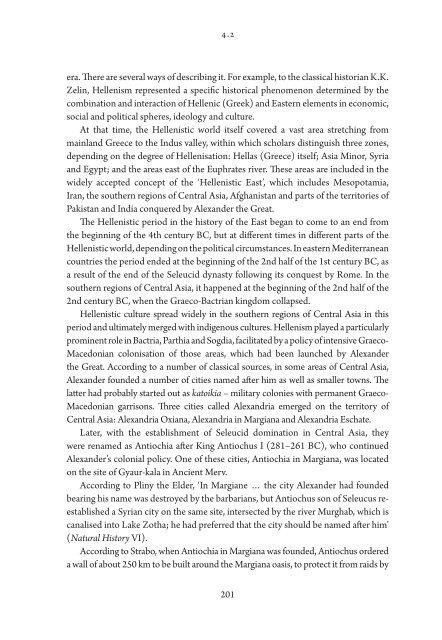Create successful ePaper yourself
Turn your PDF publications into a flip-book with our unique Google optimized e-Paper software.
4 .2<br />
era. There are several ways <strong>of</strong> describing it. For example, to the classical historian K.K.<br />
Zelin, Hellenism represented a specific historical phenomenon determined by the<br />
combination and interaction <strong>of</strong> Hellenic (Greek) and Eastern elements in economic,<br />
social and political spheres, ideology and culture.<br />
At that time, the Hellenistic world itself covered a vast area stretching from<br />
mainland Greece to the Indus valley, within which scholars distinguish three zones,<br />
depending on the degree <strong>of</strong> Hellenisation: Hellas (Greece) itself; <strong>Asia</strong> Minor, Syria<br />
and Egypt; and the areas east <strong>of</strong> the Euphrates river. These areas are included in the<br />
widely accepted concept <strong>of</strong> the ‘Hellenistic East’, which includes Mesopotamia,<br />
Iran, the southern regions <strong>of</strong> Central <strong>Asia</strong>, Afghanistan and parts <strong>of</strong> the territories <strong>of</strong><br />
Pakistan and India conquered by Alexander the Great.<br />
The Hellenistic period in the history <strong>of</strong> the East began to come to an end from<br />
the beginning <strong>of</strong> the 4th century BC, but at different times in different parts <strong>of</strong> the<br />
Hellenistic world, depending on the political circumstances. In eastern Mediterranean<br />
countries the period ended at the beginning <strong>of</strong> the 2nd half <strong>of</strong> the 1st century BC, as<br />
a result <strong>of</strong> the end <strong>of</strong> the Seleucid dynasty following its conquest by Rome. In the<br />
southern regions <strong>of</strong> Central <strong>Asia</strong>, it happened at the beginning <strong>of</strong> the 2nd half <strong>of</strong> the<br />
2nd century BC, when the Graeco-Bactrian kingdom collapsed.<br />
Hellenistic culture spread widely in the southern regions <strong>of</strong> Central <strong>Asia</strong> in this<br />
period and ultimately merged with indigenous cultures. Hellenism played a particularly<br />
prominent role in Bactria, Parthia and Sogdia, facilitated by a policy <strong>of</strong> intensive Graeco-<br />
Macedonian colonisation <strong>of</strong> those areas, which had been launched by Alexander<br />
the Great. According to a number <strong>of</strong> classical sources, in some areas <strong>of</strong> Central <strong>Asia</strong>,<br />
Alexander founded a number <strong>of</strong> cities named after him as well as smaller towns. The<br />
latter had probably started out as katoikia – military colonies with permanent Graeco-<br />
Macedonian garrisons. Three cities called Alexandria emerged on the territory <strong>of</strong><br />
Central <strong>Asia</strong>: Alexandria Oxiana, Alexandria in Margiana and Alexandria Eschate.<br />
Later, with the establishment <strong>of</strong> Seleucid domination in Central <strong>Asia</strong>, they<br />
were renamed as Antiochia after King Antiochus I (281–261 BC), who continued<br />
Alexander’s colonial policy. One <strong>of</strong> these cities, Antiochia in Margiana, was located<br />
on the site <strong>of</strong> Gyaur-kala in Ancient Merv.<br />
According to Pliny the Elder, ‘In Margiane … the city Alexander had founded<br />
bearing his name was destroyed by the barbarians, but Antiochus son <strong>of</strong> Seleucus reestablished<br />
a Syrian city on the same site, intersected by the river Murghab, which is<br />
canalised into Lake Zotha; he had preferred that the city should be named after him’<br />
(Natural History VI).<br />
According to Strabo, when Antiochia in Margiana was founded, Antiochus ordered<br />
a wall <strong>of</strong> about 250 km to be built around the Margiana oasis, to protect it from raids by<br />
201


